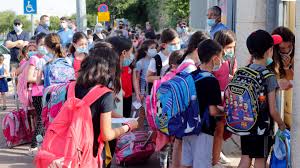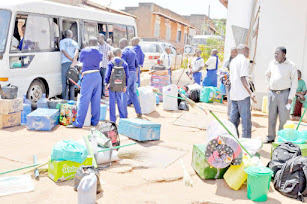By Cassious David Kisakye
According to the United Nations International Children's Emergency Fund (UNICEF) 90% of the over 1billion students in the world have suffered some form of hindrance to their education because of the pandemic. Even in this uncertainty, some countries have found a way to reopen schools.
By June, 2020 almost 70 countries had re-opened their schools just four months into the global pandemic. Countries like S.Korea that are known for their rigorous 12 hour school schedules, reopened their schools to mostly the younger students. Whilst Denmark, the first European country to welcome back its students, did so even earlier after just a month into the lockdown.
 |
| An example of a classroom in South Korea after the reopening of schools (Courtesy photo) |
While closer to home, Uganda like most African countries has decided against allowing students to return almost 7 months after they were sent home. Though in recent weeks, President Museveni has hinted at their reopening. “On Friday, His Excellency met with the National Task Force team and instructed them to review the possibility of a phased reopening of schools starting with candidate classes and clinical medical students,” According to the Minister of ICT and National Guidance, Judith Nabakooba.
 |
| Hon. Nabakooba addressing the press on the issues discussed with President Museveni about the pandemic. (Courtesy photo) |
Most of the measures set up for schools that have reopened are the same upon consultation with the various stakeholders like health officials of the numerous countries that have followed this path. They’ve issued measures like:
These measures are but a few of those in practice and as countries come out of lockdown, new innovations will be designed. Countries like Japan actually did well at first when the schools reopened because of the spaced school programmes as well as the various tests done.
However on the flip side, these standards of operations are not flawless and some would say they were premature as they have backfired in some countries. A back to School tracker created by Randa Grob-Zakhary, C.E.O of Insights for Education analyzed the experiences from 183 countries. It discovered that most countries that reopened their schools, recorded an increase in COVID-19 cases.
 |
| Students in Israel were ordered to return home after schools were shut due to a rise in COVID-19 cases. (Courtesy photo) |
In Israel, the government had too close 700 schools again because of this. In South Africa just after one month, 1260 students and over 2400 teachers contracted the virus and because of this, 968 schools were closed. In Senegal, President Sali Mackay postponed the reopening of schools after an increase in infections among the teachers. While the leaders of Bangladesh and Philippines who have completely refused to open up schools again until a COVID-19 cure is found.
 |
| A COVID-19 testing camp is set up outside a school in South Africa after a spike in cases. (Courtesy photo) |
In these unprecedented times when there isn’t a full proof solution at the moment, we have to be careful at jumping onto the bandwagon of theories for example, the unconfirmed belief that children aren’t as affected by the virus compared to the elderly. Its scientifically proven that kids were very effective infectors as seen in the 2009 H1N1 influenza pandemic when the virus was spread among the population. The African countries like Uganda have had to adopt the rather costly mode of online learning which is going to be a tumbling block considering that 80% of the population on the continent don’t have access to the internet.
 |
| Students in Kampala, Uganda returning home after schools were shut in March, 2020 (Courtesy photo) |
When or if most students return to schools, they will be met with a different and almost alien system of education. That is our new normal.

























